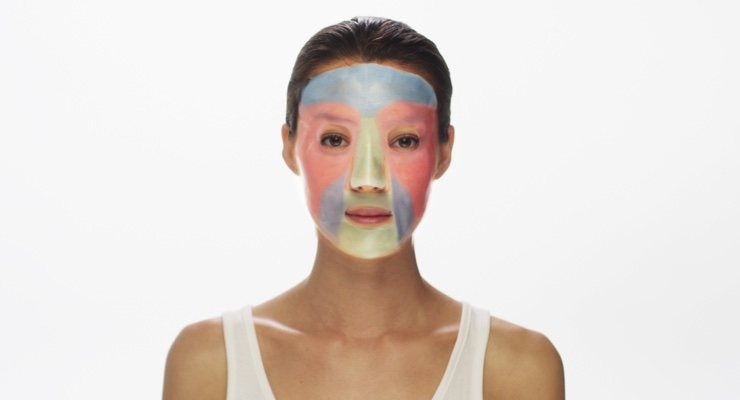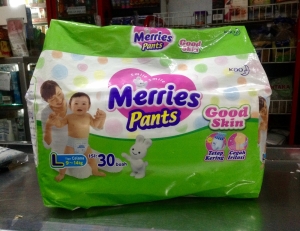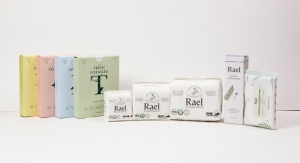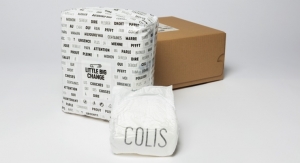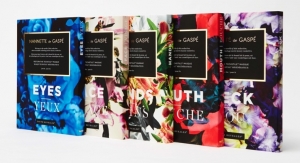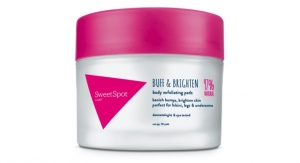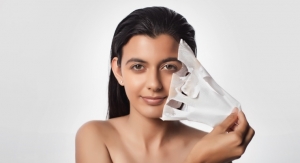Tara Olivo, Associate Editor01.23.19
U.S. skincare brand Neutrogena is launching a first-of-its-kind personalized sheet mask that will be delivered directly consumers’ homes. Earlier this month, Neutrogena MaskiD was unveiled at the Consumer Electronics Showcase (CES) in Las Vegas.
According to Dr. Michael Southall, head of R&D Innovation at Neutrogena, the idea for the personalized product started with the 2018 launch of the Neutrogena Skin360. The smartphone-enabled tool allows consumers to understand their skin at a deeper level by measuring the skin’s health above and below the surface—using technology once only available to dermatologists to record metrics including pore size, fine lines, and moisture levels.
“Our consumers who embraced the Neutrogena Skin360 told us how excited they are to finally understand the unique aspects of their own skin—and they told us they want more,” Dr. Southall says. “We challenged our Neutrogena scientists to go beyond personalized analysis to provide individual and personalized skincare solutions.”
Neutrogena MaskiD works by using proprietary algorithms—based on decades of industry-leading research—and machine learning to recommend the right products from its portfolio for each user and help track results over time, users can create custom sheet masks that are three-dimensional printed to fit perfectly every aspect of their face, with precise amounts of active ingredients only where they are needed.
Created, invented and prototyped in the halls of Johnson & Johnson, the brand created the Neutrogena MaskiD prototype in four months, Dr. Southall says.
The single-use hydrogel sheet mask will be made from renewable materials – skincare active ingredients, a hydrating hydrogel made from locust beans, and red seaweed, and a nonwoven support for fit and comfort.
“Hydrogels made from locust beans and red seaweed provide naturally derived options for consumers looking for all plant-based beauty and more environmentally sustainable products,” Dr. Southall explains. “Plant based cellulose hydrogels works really well with our 3D printing process to lock in moisture and hold the active skincare ingredients where they are needed.”
Personalization with the Neutrogena MaskiD happens in three ways – first with the shape of the mask itself. Using a smartphone 3D camera, the user simply snaps a selfie to create a precise, multi-dimensional map of their face and the exact measurements and shape of their nose, space between the eyes, lips, and other unique physical characteristics.
Next, personalized data from the Neutrogena Skin360 system creates the virtual equivalent of a knowledgeable dermatologist and analyzes the skin’s needs, making a recommendation for what ingredients will be most beneficial and where. Finally, using a proprietary 3D printing process, high-efficacy ingredients are printed onto the custom-fit hydrogel mask on the exact zones of the mask where they will deliver the greatest benefit for that individual.
“Facial sheet masks are a familiar and enjoyable experience for consumers. Masks are hugely popular around the world. In 2017, the value of the global face mask market surpassed $6.4 billion USD,” Dr. Southall says. “Sheet masks were an obvious choice for our first foray into data-driven, personalized skin care products as they are an effective vehicle for skincare ingredients by creating a physical barrier to lock in nourishing ingredients and saturates the skin to help the ingredients work with the skin.”
Neutrogena MaskiD will be sold exclusively on Neutrogena.com to consumers in the U.S. beginning in Q3 of this year.
According to Dr. Michael Southall, head of R&D Innovation at Neutrogena, the idea for the personalized product started with the 2018 launch of the Neutrogena Skin360. The smartphone-enabled tool allows consumers to understand their skin at a deeper level by measuring the skin’s health above and below the surface—using technology once only available to dermatologists to record metrics including pore size, fine lines, and moisture levels.
“Our consumers who embraced the Neutrogena Skin360 told us how excited they are to finally understand the unique aspects of their own skin—and they told us they want more,” Dr. Southall says. “We challenged our Neutrogena scientists to go beyond personalized analysis to provide individual and personalized skincare solutions.”
Neutrogena MaskiD works by using proprietary algorithms—based on decades of industry-leading research—and machine learning to recommend the right products from its portfolio for each user and help track results over time, users can create custom sheet masks that are three-dimensional printed to fit perfectly every aspect of their face, with precise amounts of active ingredients only where they are needed.
Created, invented and prototyped in the halls of Johnson & Johnson, the brand created the Neutrogena MaskiD prototype in four months, Dr. Southall says.
The single-use hydrogel sheet mask will be made from renewable materials – skincare active ingredients, a hydrating hydrogel made from locust beans, and red seaweed, and a nonwoven support for fit and comfort.
“Hydrogels made from locust beans and red seaweed provide naturally derived options for consumers looking for all plant-based beauty and more environmentally sustainable products,” Dr. Southall explains. “Plant based cellulose hydrogels works really well with our 3D printing process to lock in moisture and hold the active skincare ingredients where they are needed.”
Personalization with the Neutrogena MaskiD happens in three ways – first with the shape of the mask itself. Using a smartphone 3D camera, the user simply snaps a selfie to create a precise, multi-dimensional map of their face and the exact measurements and shape of their nose, space between the eyes, lips, and other unique physical characteristics.
Next, personalized data from the Neutrogena Skin360 system creates the virtual equivalent of a knowledgeable dermatologist and analyzes the skin’s needs, making a recommendation for what ingredients will be most beneficial and where. Finally, using a proprietary 3D printing process, high-efficacy ingredients are printed onto the custom-fit hydrogel mask on the exact zones of the mask where they will deliver the greatest benefit for that individual.
“Facial sheet masks are a familiar and enjoyable experience for consumers. Masks are hugely popular around the world. In 2017, the value of the global face mask market surpassed $6.4 billion USD,” Dr. Southall says. “Sheet masks were an obvious choice for our first foray into data-driven, personalized skin care products as they are an effective vehicle for skincare ingredients by creating a physical barrier to lock in nourishing ingredients and saturates the skin to help the ingredients work with the skin.”
Neutrogena MaskiD will be sold exclusively on Neutrogena.com to consumers in the U.S. beginning in Q3 of this year.

